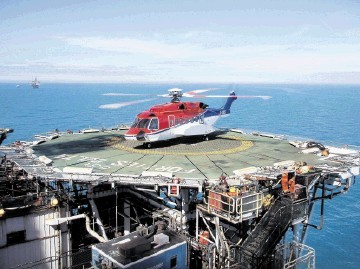
North Sea oil and gas is to the fore at a helicopter safety conference in Vancouver, Canada, this week.
The 2015 Safety & Quality Summit, organised by chopper firm CHC Helicopters, got under way on Monday and ends today.
Launching it, CHC president and chief executive Karl Fessenden said helicopter operators needed to “better embrace” offshore oil and gas workers.
“Everyone who helps extract oil and gas from under the earth’s surface must be involved, engaged and accountable for an integrated, industry-wide safety management system,” he told around 700 helicopter industry delegates.
“Achieving that requires genuine leadership and unfailing communication, spanning senior executives, finance, recruiters, managers and the people who…make up the silent majority.”
Mr Fessenden warned it was no simple matter to create such a culture in an industry as large, complex, diverse and globally distributed as helicopter-based offshore transportation.
“But it is not rocket science, either,” he said, adding: “Along with our partners at the UK’s Step Change for Safety, we believe the first step is assuring that the offshore workers who are our passengers are not seen – and do not see themselves – as merely self-loading freight.
“Too often, our communication with offshore workers – like with other members of the silent majority – is perceived as a checklist exercise; one way and hollow.
“We need to make plain to offshore workers and others that we need them – we want them – to be active in a shared safety mission.”
Mr Fessenden said considerable progress had been made since last year’s CHC Safety & Quality Summit, when there was much discussion about confronting the “reality of our reality” by challenging accepted theory, forging common objectives and knocking down barriers so that knowledge and effort could be shared for the common good.
He said: “An important first step came 18 months ago, when CHC, Babcock (Avincis, at the time) and Bristow initiated a joint review of offshore helicopter safety in the North Sea.
“The companies recognised that combined experience and ideas could lead our industry to greater understanding and better, faster solutions.
“Doors that were typically closed to other operators were opened and communication between the companies has been enhanced – all without compromising healthy competition.
“That original, more informal initiative has since been expanded, significantly funded and made more deliberate and lasting. Companies such as Era and PHI have joined us in what is known as HeliOffshore.”
This body, launched last October, has a global mandate to include, engage and share accountability among currently 44 or so member organisations, with more in the pipeline for signing up.
Mr Fessenden said: “The primary common ground is that we all have significant stakes in offshore helicopter safety.”
Recommended for you
